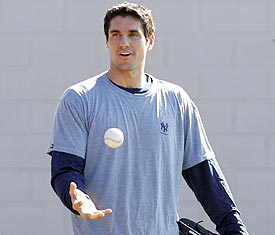
How much better would professional sports be without the burden of multi-year, multi-million dollar contracts?
Think about it for a minute.
How many bad contracts are there in sports? How about on your favorite baseball team? Too many to count. And I'm not just talking about the Yankees, or the Knicks. The whole idea of these contracts is simply and quite obviously ludicrous on several levels.
1. This year's minimum salary in the NBA is just under 400 thousand, roughly the same as the president of the United States. That means that Mardy Collins and Dub-Yah make the same. Sounds fair.
2. Is Derek Jeter's salary of roughly 20 million a year astronomical? Yes. However, the problem is more than just one man. What I like to call the "comparatively" clause comes into effect all the time. For instance, if Edgar Renteria can make 9 million a year for the Braves, why can't Jeter make twice as much for the Yanks? He's twice the player, at least, so shouldn't his salary reflect this?
3. Potential. Constantly and seemingly endlessly, GM's find themselves chasing after the ever-elusive capacity for greatness. Contracts are doled out on the basis of a good series, gritty performance, or wingspan. Some examples that immediately come to mind: Jerome James (5 yrs, 30 million) (career avg. of 4.7 ppg and 3.3 rpg) (exploded in the playoffs two seasons ago--13 ppg, 7 rpg); A.J. Burnett (5 yr, 55 million) (career record of 49 and 50 coming into this season)
The list is truly never ending, and the NBA and the MLB seem to always come ahead of the NFL as far as awful contracts are concerned. This summer alone has produced some awful contracts: Ben Wallace (5 for 60), this coming from a guy who might not score 60 points a month. Nene (6 for 60), a man with only one name and equal number of post up moves. Recently Jared Jeffries signed with the Knicks for 5 years, 30 million. Again, slightly high when one considers that Jeffries has never averaged over 7 ppg or over 5.2 rpg in any of his 4 seasons. But, he is tall, and supposedly has a great wingspan and plays D. Seems worth 30 million. Last year, Marko Jaric proved he wasn't worth his 5 years, 35 million. Kenyon Martin proves every year that 71 million dollars for an oft-injured, over-hyped dunk-dependent power forward was about 65 million dollars too high.
In the majors, how about Kevin Millwood. He hasn't been that bad this year, unfortunately. But, 4 years 48 million is a ton for a guy who has consistently shown he can't be anything more than a good no. 2 starter. Too bad Texas is depending on him to be an ace.
So, what's the solution? Simple. Follow the NFL's lead. Contracts can, technically, be as long as a Maurice Clarett rap sheet (i.e. Mark Brunell's 7 year, 49 million contract, which, if he plays out, will see him at 42). But, as in the NFL, contracts should be able to simply cut at any time. Players will be compensated if the cut comes from an injury, but the player can't receive the majority of the salary. Say, for instance, your recently drafted in the top 3 PG from Duke got into a motorcycle accident and it was stated in his contract that he couldn't ride his crotch rocket, you'd be off the hook. Or, let's say the previous season's game 7 hero hurt his knee playing basketball, which was prohibited in his contract, you'd also be off the hook. Those are just hypotheticals, but one could imagine if a team had to actually pay a player in those situations...And, if a player was injured during the majority of his contract and came back to later pitch (see Carl Pavano who will most likely pitch again at some point for the Bronx Bombers but has missed a full year already with a littany of injuries), he wouldn't get the money he normally would accrue while on the DL.
Finally, every sport needs a salary cap. Just like there shouldn't be a New York Yankees at the tip top, there shouldn't be a Florida Marlins.
Don't even get me started on getting rid of team. This is just a start. We all know none of this will happen, but its fun to dream, right? So, when this winter rolls around, and some Chris Capuano type is getting paid well over 50 million dollars to come to the AL, think of what could have been.
No comments:
Post a Comment